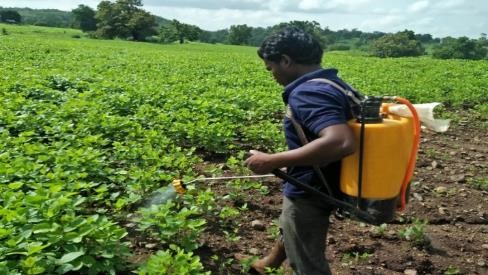STORIES OF CHANGE
Organic Farming: An Empowering and Sustainable¬ Development Strategy for Farmers
Posted Date:

The scenario of Indian Agriculture has changed drastically since the advent of the green revolution. Now, people are inclined more towards chemical-based farming to get higher yield and profit. But at the same time, it is hard to procure such fertilizers and pesticides as they are expensive. It becomes more difficult for a farmer to afford them when there is a crop failure leading to huge losses. Farmers, especially an impoverished tribal farmer, cannot bear such setbacks who live in far-flung area and have spent the last penny in their pockets.
Success or failure cannot be predicted by us. However, we can mitigate the impacts through alternatives. One such substitute is organic farming. Moreover, an added expert intervention would be the icing on the cake.
Such is the case of Shiva kisan samuh, a group of tribal farmers, of the Awagad village located in Chikaldhara block of Amravati district of Maharashtra. Earlier, the group of farmers here used to invest their hard-earned money to buy fertilizers & pesticides (DAP, Urea) with an intent to make profits and higher yields. But these inputs increased their cost of production and the returns were significantly low, worsening their economic condition. Continuous usage of chemicals deteriorated the soil quality and invited many kinds of pests and diseases, requiring additional expenses on the pest management. Jitendra, one of the farmers, said; “Fasal me kide lag jane par dawai kharidne ke bhi paise nahi hote the” (We could not afford to buy pesticides in case of a pest attack). This was not the only case witnessed on the ground. There were many others who could not save their crop, due to lack of money, and suffered huge loss.
Their hardships were far from over but timely intervention of Sabal - Nutrition Health Worker (NHW) brought a new ray of hope into the lives of these tribal farmers. They introduced the concept of organic farming and taught various techniques to make agriculture lucrative.
NHW introduced Integrated Nutrition management (INM) under which they taught various techniques including seed conservation, making compost with cow dung & urine , vermicomposting , making compost out of the burial of a dead animal called “Samadhi khad” in local dialect and making organic urea with sand & indigenous cow urine, known for its high content of nitrogen. They also introduced Integrated Pest Management (IPM) in which farmers were taught to make pest repellants out of locally available ingredients. Around 18 farmers of the group adopted this technique. All these techniques not only benefited the tribal to a great extent but also saved their precious money from getting wasted. Gradually, the microbial activity in the soil had been improved which contributed to better fertility rates and overall soil health.
The Shiva kisan samuh has been practicing organic farming for two years now under the guidance of Nutrition health worker. Motilal, one of the farmers from collective said, “ab bahar se kuch kharidna nahi padta, aur ghar par hi bohot kuch banana sikh liya hai” (Now I don’t need to procure from outside as I have learned to make everything I need at home). This has reduced the production cost significantly as they no longer rely on chemical-based solutions. A steady rise in production levels has been noticed since the adoption of organic farming.
Two years ago, one of the farmers of the collective had produced 1.5 quintals of wheat under chemical-based farming and now under organic farming, they were able to produce 2.5 quintals from the same piece of land, with the application of home-made fertilizers and pesticides.
Now they are self-reliant and looking to expand their cultivation area to grow multiple crops during the same season. Crop diversification can ensure their food and nutrition security even at the time of a catastrophe.
A recent tour to the farms of Shiva collective was a treat to the eyes. The crops were healthy and higher in density than before. “Hum SABAL ke bohot bohot abhari hai “(we are very grateful to the SABAL project), said one of the farmers.
SABAL has not only paved a path for their growth but has also showed that agriculture could be lucrative, if the right techniques were adopted.
